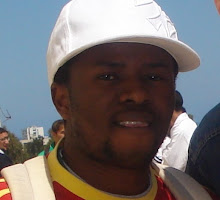
Nov. 6: Protegee carries her niece, Response, left, as she looks for her parents in the village Kiwanja, eastern Congo.
Some 134 youngsters without guardians have been registered since the end of October, but the Red Cross said the real number could be much higher.
"There was panic when the guns started to fire," said Prosper Sebuhire, the Goma-based manager of the new campaign. "People fled in every direction. In the confusion, many people lost sight of their children."
Messages are being broadcast on four radio stations in violence-struck areas and the Red Cross will begin posting photographs of lost children in areas where displaced people are gathered.
Fifteen families have been reunited over the past week, the Red Cross said in a statement.
Rebels supporting breakaway Gen. Laurent Nkunda launched an offensive in eastern Congo on Aug. 28. The fighting is the latest round in years of conflict that began when Rwanda's genocidal Hutu fighters fled over the border and into the Congolese forest after killing over 500,000 Tutsis in 1994.
Nkunda says he is fighting to protect Congo's minorities, especially ethnic Tutsis. But critics say Nkunda is more interested in raw power and Congo's mineral wealth.
Both government and rebel fighters have been accused of raping, mutilating and killing civilians.
The current force of 17,000 U.N. peacekeepers — the largest U.N. peacekeeping force in the world — is expected to be reinforced with an additional 3,000 soldiers, but they may take several months to deploy.
U.N.-backed peace talks are under way in Nairobi, Kenya, led by special U.N. envoy Olusegun Obasanjo, who hopes the talks can establish a lasting cease-fire and allow aid deliveries into the troubled region. But neither Nkunda nor Congolese president Joseph Kabila is attending.
Obasanjo, a former Nigerian president, said Tuesday that preliminary talks between Kabila and Nkunda's representatives were "making progress" and that more "substantive" talks could begin before Dec. 25.
Congo's 1998-2003 war drew in the armies of at least six nearby nations and aid groups say ongoing violence has left more than 3 million people dead. The latest clashes have sparked fears that Congo could return to all-out war.
 Radisele is a small rural village about 250km north of the capital of Botswana, Gaborone. Although the local primary school offers basic education, the children barely own necessary learning materials (such as paper, pens, etc.). To provide these children with a better learning environment, your contribution through the purchase of this calendar will be used directly for educational materials. Thus, this project is to help create higher educational standard in Radisele.
Radisele is a small rural village about 250km north of the capital of Botswana, Gaborone. Although the local primary school offers basic education, the children barely own necessary learning materials (such as paper, pens, etc.). To provide these children with a better learning environment, your contribution through the purchase of this calendar will be used directly for educational materials. Thus, this project is to help create higher educational standard in Radisele.
 BOCCS means Buyantanshi Open Christian Community Schools. The BOCCS project operating under the leadership of the Mülheimer Association from Germany runs eight schools in the town of Kabwe in Zambia. The schools are attended by more than 4,000 students. These students who live in poor conditions - mostly without electricity and water supply - are provided with educational opportunities. In the BOCCS schools the children learn theoretical knowledge as well as practical skills for basic self-help.
BOCCS means Buyantanshi Open Christian Community Schools. The BOCCS project operating under the leadership of the Mülheimer Association from Germany runs eight schools in the town of Kabwe in Zambia. The schools are attended by more than 4,000 students. These students who live in poor conditions - mostly without electricity and water supply - are provided with educational opportunities. In the BOCCS schools the children learn theoretical knowledge as well as practical skills for basic self-help. On the following sites you can inform yourself about "Share-for-smiles".
On the following sites you can inform yourself about "Share-for-smiles".



